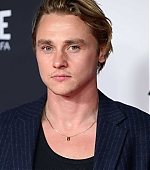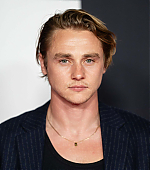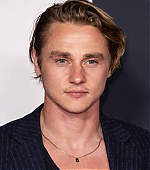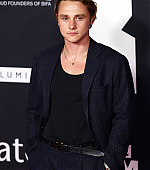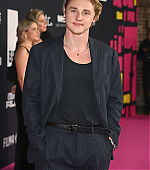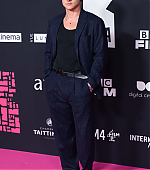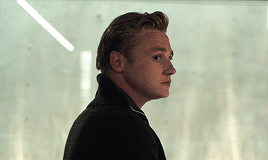
| Ben Hardy, Events, Gallery Updates | February 21, 2026 |
Ben Hardy attended British GQ Celebrates Excellence in Film with Paul Smith yesterday in London. Photos from the event have been added into the gallery.


| Ben Hardy, Gallery Updates, Interviews, Photoshoots | October 29, 2025 |



Photoshoots > Outtakes > Session 031
SOMETHING ABOUT ROCKS – The actor also spoke about his “proudest” moment in ‘Bohemian Rhapsody and the advice he received from Michael Fassbender
Actor Ben Hardy covers the latest issue of Something About Time – find out how to get your copy below.Hardy opened up to Scarlett Baker at Something About Rocks about an autumn that saw him appear in one of the biggest horror franchises of all time – The Conjuring – as well his favourite watches and cinema heroes.
Hardy told us how he wanted to always be in a horror movie, but that it always “had to be the right one.”. Hardy landed a part in one of the highest grossing and acclaimed horror franchises of all time and in autumn this year, the final outing in the series, The Conjuring: Last Rites. “I consider myself very fortunate to be part of this franchise,” he told us. “I’ve become even more of a horror fan since being in the movie.”
He continued: “I always think of horror more as escapism. It’s so engaging, and it brings us so much into our primitive state of survival: fight or flight. The adrenaline can really be flowing through your body during a horror movie which is why I think a lot of people don’t like it because it makes them feel too engaged with that primordial self when they just want to relax. But I think a lot of films are about engaging with those primal emotions, and horror captures that and really has the power to transport you and take you out of your everyday life and keep you on the edge of your seat.”
He also reflected on his past achievements in films including Bohemian Rhapsody and X-Men.
On Bohemian Rhapsody, in which he played Queen drummer Roger Taylor, it says it was his proudest moment: “For it to come out and [do as well as it did] was incredible. More so than for the [fact] it won awards and all those kinds of things – but it was the amount of joy that movie brought to so many people. That makes me feel proud for sure, to be a part of something like that.”
On X-Men: Apocalypse, he also talked about the advice that Michael Fassbender gave him after a particularly challenging day on set.
He explained: “I was so nervous,” he recalls.
“And so tense because I had major imposter syndrome – like ‘how am I here?’ I remember I messed up: I laughed, because someone made me laugh on set, and then I stopped. Michael Fassbender was like ‘you should have used it‘ and that kind of stuck with me. It freed me up a lot at a young age because I was like, ‘I’m just going to keep playing, keep exploring.’
“In that moment I could have used that laugh and played with it and done something with it, but instead I stopped and restarted the take. It stuck with me. Michael Fassbender is phenomenal. He’s one of my favourite actors.”
He also opened up about some of his favourite watches, not least Cartier. “It’s gorgeous,” he notes of the Cartier watch he wears for our cover shoot. “I would love to get a watch much like this Cartier Santos, and have it passed down in the family. I’m very family-orientated and I have a watch of my dad’s that I love too.” He also has his eye on a Piaget, fawning over the one he’s wearing for the shoot today.
To read the full feature in the issue, you can buy a copy here.
| Ben Hardy, Gallery Updates, Projects, Projects, Screen Captures, The Conjuring: Last Rites | October 8, 2025 |
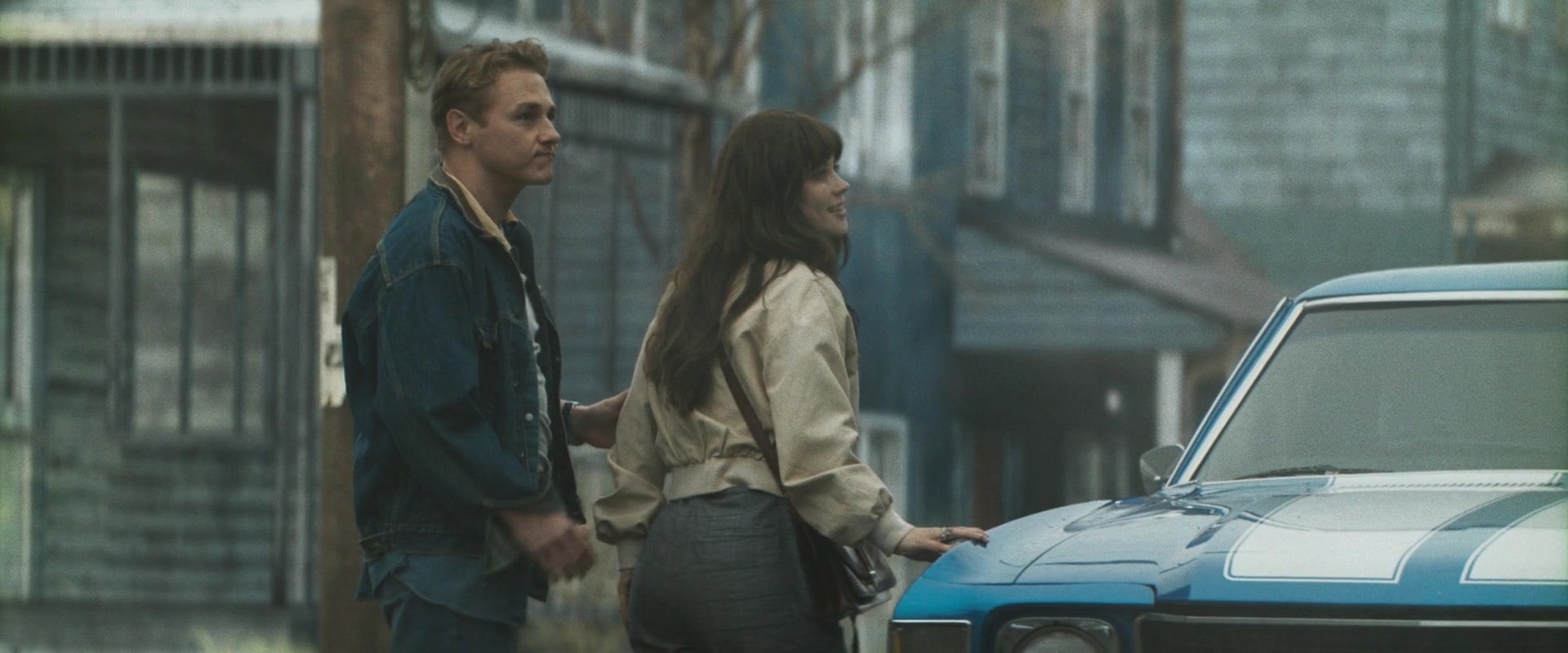
Over 500 HD screen captures of Ben in The Conjuring: Last Rites have been added into the gallery. The film is now available to purchase digitally on your choice platform!
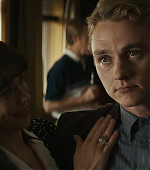
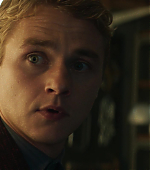
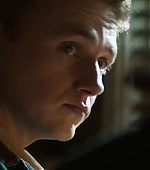
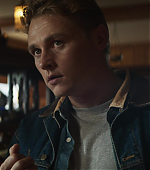
Film Productions > 2025 | The Conjuring: Last Rites > Captures
| Ben Hardy, Gallery Updates, Interviews, Photoshoots, Projects, Unicorns | August 18, 2025 |


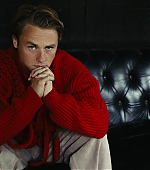
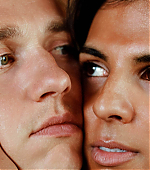
Photoshoots > Outtakes > Session 029
BOYS BY GIRLS – Intimacy, as a word, is defined as close familiarity. This closeness presents itself in different ways to different people, and actors Ben Hardy and Jason Patel embraced a new exploration of intimacy while filming UNICORNS. The story follows Aysha/Ashiq, Jason’s character, and Luke, Ben’s character, as the two form an undeniable friendship that evolves, in fits and starts, into romance. Throughout our conversation, Ben and Jason mirrored each other in their perceptions of the various acts of intimacy that form the beating heart narrative at the film’s centre. Yes, they were discussing the physical love-making between their characters, but emphasised how Aysha/Ashiq and Luke are close in a way that transcends traditional boundaries of sex.
As Jason says, having these moments of fully seeing another person and allowing them to see you in return is “so frightening to 99% of people in the world.” He continues, “That’s why the film translates well. Just because you don’t look like these characters, doesn’t mean you don’t know that feeling.” Ben echoed this sentiment and spoke about how Luke connected in a way he hadn’t done before because of how close he allowed himself to get to Aysha. It’s these consistent, sustained moments of genuine human connection that make the film universally relatable.
The level of care that Ben and Jason have for their characters, and each other, adds another layer of intimacy to the experience of watching UNICORNS. “I will say, Jason is very generous, and very giving, and he does think about others a hell of a lot,” Ben told me. Jason thanked him and returned the favour by saying that Ben is a “really good hype man” who always shows up for people. Showing up for people is one of the easiest ways to create a sense of close familiarity – whether that’s by getting your friend a cake made primarily from icing, or by driving your child to the train station in the middle of the night so they don’t miss an important audition.
Watching UNICORNS and having this conversation with Ben and Jason reminded me of the myriad ways we can create and build intimacy in our lives. I hope, after reading through our hour-long discussion, that it can do the same for you.
What’s the best pickup line you’ve each heard?
Jason: I was walking down the street in Brooklyn yesterday, and this guy was like, “Excuse me, can I give you a compliment?” I said yes, and he was like, “You look so hot right now.” I was dying because five minutes before that, I was on the phone with my friend, being like, “Why has no one said I was hot today in New York? No one has stopped me on the street. This is a crime!” I had to voice record the conversation, but it got very inappropriate.
Ben: I don’t think I’ve ever had someone do a chat-up line on me. If I’ve ever done them, they were meant to be a joke. I’d do is the very classic one where you check their clothing label and say, “Was this made in heaven?” [Sam and Jason laugh]
Jason: I’m going on a date tomorrow, so I have to use that.
Ben: What’s your favourite, Sam?Jason, I hope your date goes well! I am not often on the receiving end of pickup lines, but someone’s dating profile said, “I know the best place in town for breakfast in bed.” I didn’t swipe right, but I thought that was smooth.
Ben: That’s inventive. I’m going to steal that one.We’re all filing these away for later. I’m excited to talk with you both about UNICORNS, because I absolutely loved the movie. What quality in the other person’s character do you feel most closely aligned with?
Ben: Great question. I would say that I aspire to relate to Aysha’s sense of freedom. I don’t want to speak for Jason, but I see Aysha being so authentically herself. I aspire to disregard the opinions of others. Whether or not she’s confident in it, she presents that way to Luke.
Jason: For me, it’s how much Luke loves his family, and the sacrifices he makes for them. That is a blessing and a curse because he lives for others, but I think that’s a really beautiful quality.
Ben: Jason is very generous and giving. He thinks about others a hell of a lot.It’s nice that you see those qualities in each other. It’s hard to be authentically yourself. I tell myself that what other people think of me is none of my business. Ben, your performance really comes through in the physical aspects of your character. Did the physicality happen intentionally in prep or organically on set?
Ben: That’s great advice about what other people think of you. And there was definitely an intention – he very much operates with his hands, and he’s a mechanic. I was trying to thicken my hands, because people who work in manual and skilled labour have thick hands. My mate’s a gardener and his hands are just absolute wedges. [all laugh] I was trying to constantly communicate with my hands, and I imagine he probably grew up getting into scraps. There’s also a weight that he’s carrying from grieving. He’s tired; he’s working every hour he can to provide for his son as a single parent. Have you seen Rust and Bone?No, I haven’t.
Ben: It’s a brilliant movie. Matthias Schoenaerts plays a single father, and his son is given to him unexpectedly. He’s very physical. He was a tonal reference for Luke. In terms of prepping for it, I just ate a lot of food and did a lot of pull-ups.
Jason: I did the opposite of that and was eating a spoonful of rice and chicken – rabbit food!Totally opposite! Jason, your music is featured in the film. Did you create the songs specifically for the movie?
Jason: When I was auditioning, I had sent James [Krishna Floyd] an incredible music video that I had released the year before, which popped off. That kind of became a part of my character portrayal in the colours I could add. I just said to them, “Hey, I make music. I have all these other skills. Do you want to use them? You can pick what you want.” I play the saxophone, but I was like, “They’re definitely not going to want Aysha to be playing the saxophone!” I had just finished the first draft of my EP, so when Aysha is singing in the car, that’s the introduction track of my EP. We changed a couple words, and it fit great. There wasn’t anything super precious or forced about it. It just gave a more authentic, real self.It lends well to the character and her performance. You have such an incredible voice. I would’ve loved to see you play the saxophone. We should work that into your next movie.
Ben: This is brand new information for me.
Jason: Did you not know that I play the saxophone?
Ben: No, I didn’t actually.
Jason: On our US release screening, I performed at the after-party too. Ben was a really good hype man.
Ben: It was great. Jason was absolutely fierce.I’m sorry I missed that! Is this music that you’re releasing soon?
Jason: I think I will. It’s music for people to shake their ass and get their tits out to. It’ll come out little by little, but probably by the first quarter of next year.I can’t wait to hear! If you both could pick a theme song for your character, which song would you choose?
Ben: I know mine straight away because I always do a playlist for my characters. There’s a band from Essex called Nothing But Thieves, and I’d pick their song, “Amsterdam.” There’s a part of the song where he sings about banging his head against the wall. When we find Luke, he is stuck, and there’s definitely that frustration within him. I played it a lot while running around the park before filming.
Jason: Mine is “Drew Barrymore” by SZA. That whole album is one of my favourite albums ever, but I had a couple of those songs on repeat in my mind. That song encompasses this two-wave experience, which is everything that Aysha and Ashiq go through.I loved the scene when Luke leans over in the car and puts the overhead light on for Aysha so she can do her lip liner. I thought that was such a sweet snapshot of seeing someone and recognising what they need. If you had to pick one interaction between Luke and Aysha that you enjoyed most, which one would you choose?
Jason: I really enjoy the montage when Aysha comes out on this catwalk stage to all of her fans. Luke grabs her and goes through the crowd. It felt like he was kidnapping me when we were filming it, but it was so funny. I enjoyed it when Luke became Aysha’s bodyguard. So many sparks are flying, and everything’s connecting. They’re forgetting about the outside world, which I think is really beautiful for them.
Ben: Maybe it’s an obvious moment, but the lovemaking scene is so impactful. Luke’s gone into “I’m going to fuck you mode” to try to deal with the situation, but Aysha forces him to make eye contact and be intimate, which has a profound effect on Luke. I don’t think he would’ve been able to do it on his own without Aysha guiding him.I have it written down to ask you about that moment. It feels like Luke is constantly seeking this connection where someone really sees him, and it’s an interesting mirror to the opening scene where he’s seeking that connection with the girl, and she gets up and leaves. I loved the parallel because Luke is realising that Aysha values him, sees him, and wants to connect. When you’re filming a scene like that, are you consciously thinking of everything your character has been through leading up to that point? Or are you trying to play it out in the moment?
Ben: I’m aware of everything that’s come before, but I’m trying to stay in line with what’s going through the character’s mindset in that moment, much like we are in everyday life. In that immediate moment, there’s not so much an awareness of the Tinder date at the start. I think he’s just dealing with the struggle to cross this line, because for him, that’s such a huge moment to interact with someone from the same gender. It’s fucking crazy in his mind because he thinks it would change his entire identity. I’m not talking about my perception, I’m talking about Luke’s perception, but it’s a huge gap to bridge. In that moment, he’s a guy who’s very much in the present as much as he possibly can be. But I love your analysis of it. I completely agree.Jason, how were you feeling when you were filming that scene?
Jason: That was our first day of filming. At that moment, there is a balance of energy, but you have to understand where you can make strong choices. Ben just put it in such a nice way. But I think for Aysha and Ashiq, that’s the moment when they feel seen. They’re fully connected – mind, body, and soul. Because she’s so instinctual, the energy is so raw between them, and she’s trying to connect those dots. Now they’ve grabbed onto each other. I don’t think either of them could have done it themselves if they weren’t doing it with each other. Aysha needed Luke in that moment. I don’t think Aysha’s had that level of connection physically with anyone before, either. You see that because they cry at the end. The emotional level of it was like an eruption, and then they were in sync after that.That was really well said. I think sex and intimacy are two different things, and a lot of the time, people can mistake one for the other. So, I felt like in this, it was nice to have that moment when both of your characters realised, Oh, this is intimacy.
Jason: It’s so true. But that’s such a scary thing. That’s so frightening to 99% of people in the world, and that’s why I think the film translates well. Just because you don’t look like these characters, doesn’t mean you don’t know that feeling. What really hit me when I watched it for the first time was that they’re scared at that moment, but when you’ve got that person there, it feels like you can conquer anything.Absolutely. It’s rare to experience that safety. UNICORNS captures the feeling of struggling really well in terms of the closest people to you not understanding how deeply you’re hurting. In the scene outside the party in Birmingham, Luke looks at Aysha and says, “Are you okay?” It’s such a simple question, but it holds so much weight. How do you prioritise either showing up for people in your life when they’re struggling, or how do you seek help when you’re struggling?
Jason: I feel like as you grow older, you realise how important platonic and romantic relationships are. Even just a simple text and check-in makes a difference. I’m a very energy-based person, so if I feel like I need to message someone to see if they’re okay, I’ll text or call and try to chat it out. You have to trust the relationships in your life so you can also speak to them when you need them. When you need them, they’ll show up, and vice versa. That’s a really hard thing to find, but when you find it, you should really hold onto it.
Ben: Much like Jason, I try to always be there for my friends and family. A lot of people think that [offering to be there for someone is] lip service, so it’s important to communicate that it’s not. I’m very fortunate to have family and friends around me who are a strong support system. Personally, I try to be supportive, but I struggle with veering on the edge of trying to be Mr. Fix-It, which isn’t always helpful. Sometimes you just need to be a sounding board for people and help them better figure it out themselves, rather than trying to put your stamp on it. I’m figuring that one out.I’m the same way. I’ve tried to catch myself in those moments and say, “What do you need from me? Do you want me to just listen?”
Ben: I will say, though, I’m not one for whinging. I’ll accept one rant, but if it’s the same thing over and over again, I’ve got limited patience for that. If you’re just going to rant to me and not do anything about it, that’s tough. I’m talking about day-to-day shit, not anything severe.
Jason: But that’s also a testament to your friendships. You should be able to say, “Okay, you have to be done speaking about this. What are you going to do to change it?” Friends should be able to tell each other when they’re wrong.
Ben: That’s sound advice in itself, isn’t it?It’s very good advice, and the right people will understand that. I would love to talk about the sequence when Luke and Aysha take Jamie to the fairgrounds. Did filming those scenes bring you a sense of lightness and joy amidst some heavier moments?
Ben: We went out there and were having an absolute blast, and they caught it all on camera. It was at the end of the day when we’d already shot some other stuff, so it was all very frenetic. And whenever you’re with a kid who’s genuinely enjoying themselves, it makes the experience even better. We had such a great day.I also really loved the exploration of drag culture. My friend and his husband introduced me to RuPaul’s Drag Race when I was struggling with my confidence, and seeing people be so fiercely themselves helped me feel more comfortable in my own skin. What’s the best lesson you’ve both learned from this exploration of drag culture?
Jason: I don’t know if you know this, Sam, but I had never done drag before. I had been a fan of Drag Race, and similarly, I remember during the COVID lockdown, I thought, How am I going to get my parents into gay culture to get a bit more educated? I got them to watch, and they were obsessed. This process taught me about all the layers you can put on and how much you can explore your masculine and feminine energy. When you get into drag, it feels like you’re going into battle and like you can conquer anything. I’m quite a confident person, but I found it so empowering and liberating. It makes you realise that you can blend different elements, and there’s so much beauty to be found in that grey area.
Ben: I was aware of RuPaul and drag, but I wasn’t aware of realism drag, which is what Aysha is doing. The idea that there could be a drag scene in the basement of an Indian restaurant in London blew my mind. For my friends or family who have seen this movie, and for myself, it’s been an education about that culture. I’ve gained another level of respect, in addition to the respect I already had, for what people do and what they go through. I had no idea how dangerous it could be as well. I know Jason said he hasn’t done drag before, but it really felt like I was watching Ashiq express who they truly are, or a facet of themselves that they were desperate to show the world.There’s also that moment where Aysha says, “Things only end one of two ways for South Asian drag queens. Either they end up in an arranged marriage or they jump off a bridge.” I felt like, at the end of the movie, there was this third option. What feels most impactful to you about being able to show audiences that there are more hopeful outcomes to the situations they may find themselves in?
Jason: The ending note gives them that beat of hope, that says, “We’re not going to accept this.” In life, we can protest for ourselves, and we can fight for what we believe in, who we are, and where we come from, and we’re not going to apologise for wanting to actually have happiness. People always say that word “compromise,” and I think this film shows that you can say, “No, fuck it, I’m not going to compromise. I’m going to be happy.” That kind of shit scares a lot of people, but it also inspires a lot of people to come together.
Ben: I love the ending of the movie, and I’d like to think that it’s real. I’m glad we ended that way. But there is an element of magical realism to it. I think Luke hears her footsteps before the audience does, and there’s a little sense of, “Is this real?” It was interesting hearing people’s reactions to that. At one of the Q&As we did, a very real-life Luke said, “I just don’t see how these two people could be together.” It’s interesting. It is valid because the point is that there are still a lot of obstacles to overcome. I’m not saying I agree with that cynical viewpoint, but there are still obstacles. What’s so beautiful about that ending is that it shows that they’re both willing to take that on, and who knows what that’s going to look like? There have to be people who are pioneers and take those steps to change perceptions. The ending is a beautiful thing, but it is the beginning of a pitifully slow process of change.Your answers also complement each other, because, like Jason’s saying, you can choose happiness, and it’s easier to do that when you feel supported. And like you’re saying, Ben, you can put the cynicism aside, but it’s still there. There have been so many trailblazers in the queer community who say, “I’m going to throw this brick and make it happen anyway.” The ending is hopeful, while still being realistic.
Ben: I think it’s encapsulated beautifully in the therapy line as well: “I’m saving up for therapy, lots of it.”I loved the scene toward the end where Luke brings Ashiq the lipstick to remind them of who they could still be. For each of you, what’s the most thoughtful gift you’ve ever been given?
Ben: Jason, I’ve never gotten you anything. Jason is very generous, and I am not. It is not my love language, Sam, okay? [Sam laughs]
Jason: My love languages are Physical Touch and Gift Giving.I’m a combination of Acts of Service and Words of Affirmation.
Jason: Those are yours, Ben.
Ben: I’m big on words.
Jason: I’ve gotten so many thoughtful gifts. I’ll tell you about a thoughtful gift that I gave to Ben. I got him an original Arsenal shirt. He loves Arsenal football. He was quite surprised that I got it for him. It was for his birthday.
Ben: I have it in the other room. Jason’s very kind for that. Mine is Jason’s Arsenal shirt. [all laugh] It was unexpected. He spent way too much money. I very much appreciated it. I actually got a gift from a friend that I really valued, and this sounds so stupid, but just bear with me, Sam. As a kid, I never really liked cake, but I loved icing. I would say to my parents every year that I wanted a cake made purely out of icing for my 18th birthday. They never did it. They thought I was being my usual, precocious self and didn’t take me seriously, which is understandable. But then, on my 30th birthday, a friend of mine went to a bakery, and they made a cake with as much icing as possible. It was really sweet.
Jason: That’s really cute! Oh my God, I know what my thoughtful thing is!Tell me!
Jason: When we had our chemistry test for UNICORNS, I was doing a show in the north, and I had a train booked for a Saturday at 6:00 AM to come to the screen test. The night before, the train had been cancelled at 11:00 PM, and there were no trains to London. I called my dad, panicked, he woke up, drove two hours to pick me up, drove me back to Manchester, and I got on a random train, and ended up in London for the screen test on one hour of sleep. Genuinely, that was the greatest gift he could ever give me. He doesn’t always know how to show emotions, but it showed how much he loves me, and he’s the coolest, loveliest person. I was telling him, “This is THE moment for my career,” and it was literally like Mission Impossible. He did this Tom Cruise shit for me. [all laugh]A great Acts of Service moment! If you could give the younger version of yourselves one piece of advice, what would it be?
Ben: “Who gives a fuck?” That would be the answer to every question in my head. It’s easy to say now, isn’t it? I’m in my thirties now, but I’d love to go back and give that kid some sense of reckless abandon and free him from those insecurities, worries, and concerns.I feel like it wasn’t until I got into my thirties that I was like, “Why did I spend so much time worrying about other people?” Jason, what about you?
Jason: I would tell him to come out of the closet a lot sooner, because honestly, as soon as I came out, life just blossomed. I wasn’t trying to fake anything anymore. When you’re a gay kid, you spend so much time trying to be something that you’re not, so when you do come out, you can go to an extreme. You go to the extremes of femininity, and then you go to extremes of masculinity, because you’re trying to figure out what you like. Then, you finally balance out. You become a late bloomer as you’re figuring out who you are.That’s a really impactful note to leave it on, because it mirrors what UNICORNS is about – coming into your own, and not feeling like you have to perform. Maybe a queer kid will see that and say, “Fuck it. I’m going to come out of the closet now.”
Ben: How amazing would that be?
Jason: That would be epic.
| Ben Hardy, Projects, The Conjuring: Last Rites, Video | July 31, 2025 |
Watch the final trailer for The Conjuring: Last Rites below. The film hits theaters September 5th.
